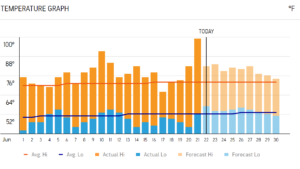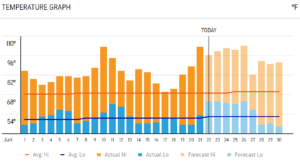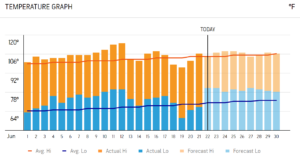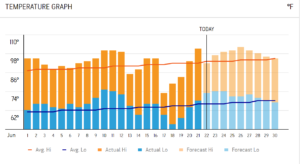The unseasonably hot temperatures currently being recorded in California’s Salinas Valley and other West Coast growing regions are raising serious concerns over quality and shelf-life for many key fruit and vegetable crops. Yesterday was the second significant heat spike of June, with temperatures reaching into the 90s even near the coast and above 100° for much of the inland area, but in general, temperatures have been above normal since early in the month and are expected to remain high through early July.
Below is a list of quality and shelf-life concerns that can be expected in commodity and value-added packs over at least the next two weeks, as well as some charts that illustrate the current temperature forecast.
Baby Leaf and Other Lettuce Items May develop:
- Bolting/Seeder
- Dehydration
- Internal burn
- Inconsistent growth
- Increased insect pressure
- Growth crack
- Rib blight
- Shortened shelf-life
- Sun burn/Sun scalding
Broccoli and Cauliflower may develop:
- Accelerated or inconsistent growth
- Dehydration
- Hollow core
- Pin rot
- Shortened shelf-life
Strawberries may develop:
- Decreased sizing
- Increased bruising
- Soft texture
- Shortened shelf-life
Coastal Salinas Valley Temperatures:

Inland Salinas Valley Temperatures:

Arizona/California Desert and San Joaquin Valley Growing Regions
Excessive heat in California’s Imperial Valley (104º to 108º) and San Joaquin Valley (100º to 103º) will impact multiple commodities. High temperatures will affect harvesting hours and may cause softness, reduced sugar, shrivel, and sunburn in the below crops:
- Bell Peppers
- Blueberries
- Cantaloupe
- Eggplant
- Honeydew
- Oranges (re-greening)
- Squash
- Tomatoes
- Watermelon
Imperial Valley Temperatures:

San Joaquin Valley Temperatures:

Markon suppliers will harvest in the early hours of the morning to avoid the peak temperatures for their production crews and commodity and value-added products. In some instances, production may be curtailed for the well-being of harvesting crews, which could lead to supply issues.
Maintaining the cold chain throughout distribution is critical for maximizing quality and shelf-life.
Please contact your Markon customer service representative for more information.
©2022 Markon Cooperative, Inc. All rights reserved.